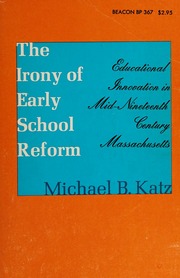
The Irony of Early School Reform
Educational Innovations in Mid-Nineteenth Century Massachusetts
References and Quotes
The most surprising thing about the start-up of mass public education in mid-nineteenth-century Massachusetts is how overwhelmingly parents of all classes soon complained about it. Reports of school committees around 1850 show the greatest single theme of discussion was conflict between the State and the general public on this matter. Resistance was led by the old yeoman class—those families accustomed to taking care of themselves and providing meaning for their own lives. The little town of Barnstable on Cape Cod is exemplary. Its school committee lamented, according to Katz’s Irony of Early School Reform, that "The great defect in our day is the absence of governing or controlling power on the part of parents, and the consequent insubordination of children. Our schools are rendered inefficient by the apathy of parents."[p.60]
Much light on these developments is shed by Michael Katz’s The Irony of Early School Reform and by Joel Spring’s historical writings. Both writers are recommended for a dense mine of information; both strike a good balance between the perspective supplied by their personal philosophies and reportage without allegiance to any particular dogma.